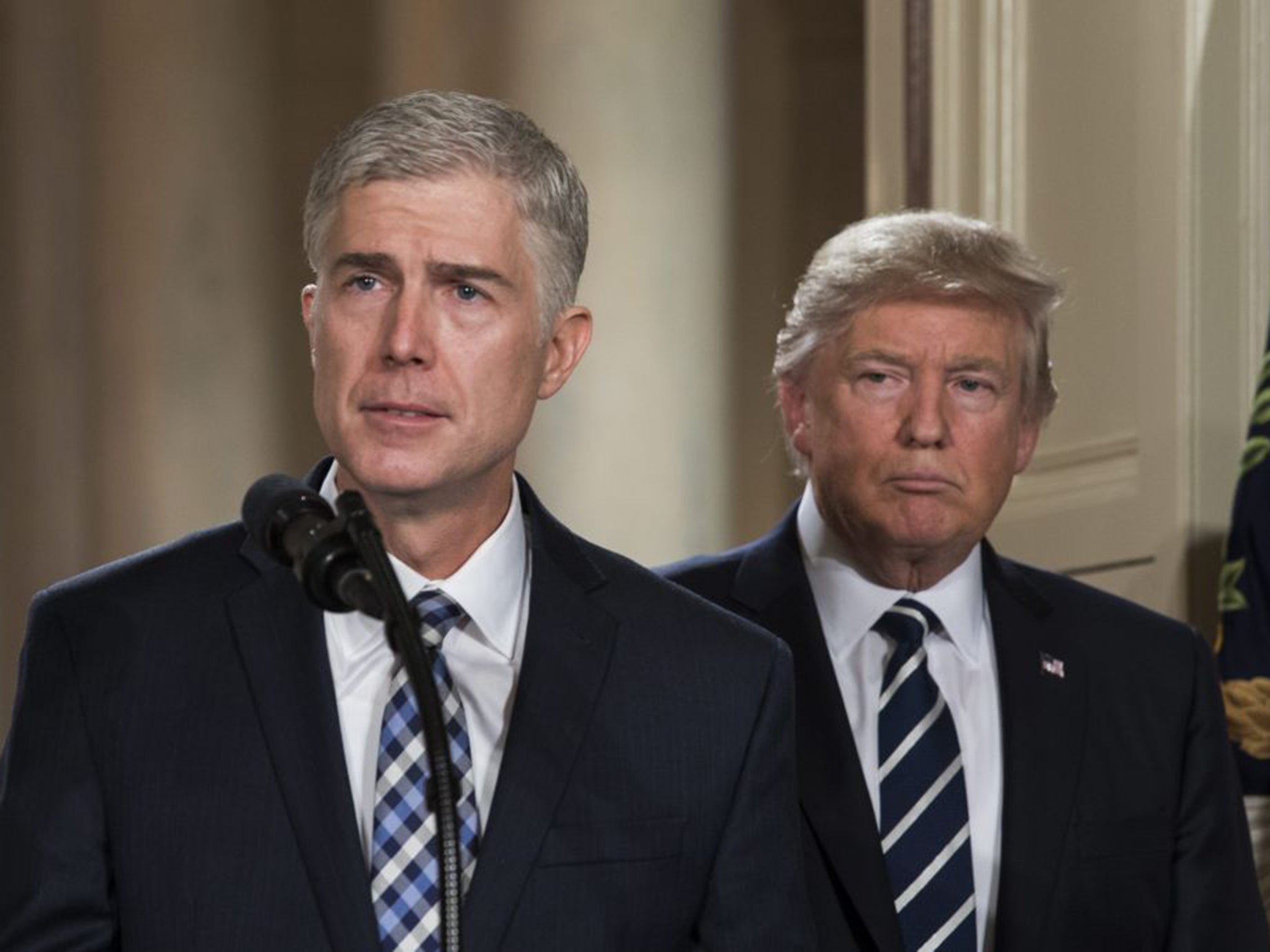Donald Trump nominates Neil Gorsuch to Supreme Court - but it will be a fight to confirm him
Many Democrats now seem all but committed to staging a filibuster to block the nomination, raising the possibility of a procedural earthquake in the Senate

Only one thing is certain about Donald Trump’s nomination of Judge Neil Gorsuch to the seat on the Supreme Court that has been vacant for almost a year. It sets up an almighty confirmation fight with Democrats that could result in a momentous change in Senate rules.
In normal circumstances, Judge Gorsuch, who is a federal appeals court judge based in Denver, Colorado, with a glittering Ivy League resume and experience at one of Washington’s top law firms, would be a conventional conservative nominee in whom Democrats, a minority in the Senate, would grudgingly acquiesce.
But these are not normal times. In the 12 days Mr Trump has been in the White House, relations between the two parties on Capitol Hill have descended into open warfare, with Democrats now delaying some of the President’s most important nominees.
Their resistance has only been stiffened by the massive popular demonstrations nationwide against the edict barring refugees from seven Muslim countries into the US. That resistance turned to anger when Mr Trump this week sacked the acting Attorney General, Sally Yates, after she defied the presidential order.
On top of that is lingering Democratic bitterness over how the Republican Senate majority, in breach of all precedent, refused to even consider Merrick Garland, the moderate judge whom President Obama nominated to the Court after the death of Justice Antonin Scalia in mid-February 2016.
Had the Garland appointment gone through, it would have tilted the Court in a somewhat more liberal direction. But the Republican majority leader Mitch McConnell, claiming it was for the people to decide at the November election, held the seat open. His gamble paid off when Mr Trump (who on the campaign trail had loudly promised a thoroughly conservative nominee) against all the odds won. Judge Gorsuch fits that bill perfectly, as a protégé and close doctrinal follower of Justice Scalia.
For many Democrats though, the Scalia seat has simply been “stolen”. They now seem all but committed to staging a filibuster to block the nomination – and that raises the possibility of a procedural earthquake in the Senate.
Judge Gorsuch will be fiercely grilled by the Senate Judiciary Committee. But the Committee vote is certain to break along party lines, and a Republican majority (11 against 9 in the last Congress) will send his nomination to the full Senate for the decisive confirmation vote. At this point, if Democratic tempers do not cool over the next few weeks, the filibuster drama would begin.
Republicans have a slender 52-48 majority in the Senate, far short of the 60 needed to override a filibuster of a Supreme Court nominee. If the deadlock persists (and some Democrats have vowed a “four year filibuster”), Mr McConnell will have to make a historic decision: whether to invoke the so-called “nuclear option” and change Senate rules to permit a Supreme Court nominee to be voted through by a simple majority.
The change would be deemed pure hypocrisy by many, given how Mr McConnell, as Republican leader used the filibuster ruthlessly to block Obama legislation and Obama nominees. It would also destroy the last shreds of the Senate’s reputation as a place of calm and sober deliberation, in which the filibuster was a weapon of last, rather than first, resort.
But Chuck Schumer, the Democratic leader in the Senate, must also make a fine calculation. If Democrats push Mr McConnell into invoking the “nuclear option” the filibuster will no longer be available to them for future – and even more important – Supreme Court nominations.
In fact, confirmation of Judge Gorsuch to the high court would merely signal a return to the status quo ante, before Justice Scalia’s sudden death during a hunting trip to Texas. The really important nomination will be the next one, that would probably follow the retirement of one of the three oldest members of the Court – the veteran liberal Justices Ruth Bader Ginsburg, 83, and Stephen Breyer, 78, and the current swing vote on theCourt, Justice Anthony Kennedy, who is 80.
The replacement of the departing Justice by a conservative would ensure a right-wing Court, perhaps for a generation. That is a consideration that Democrats have to weigh as they dig in for what will surely be a long and ill-tempered struggle.
Join our commenting forum
Join thought-provoking conversations, follow other Independent readers and see their replies
Comments
Bookmark popover
Removed from bookmarks